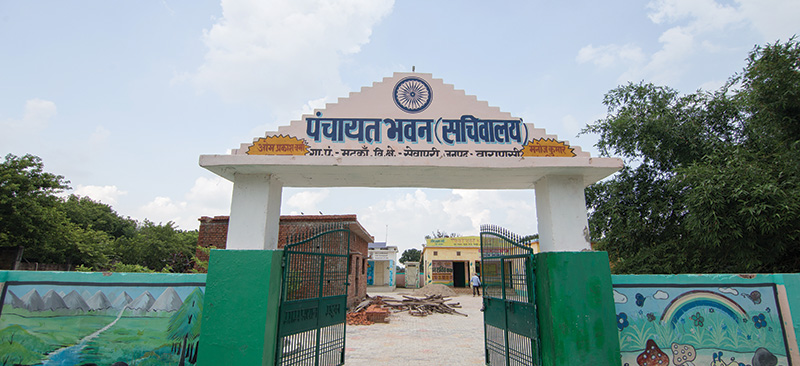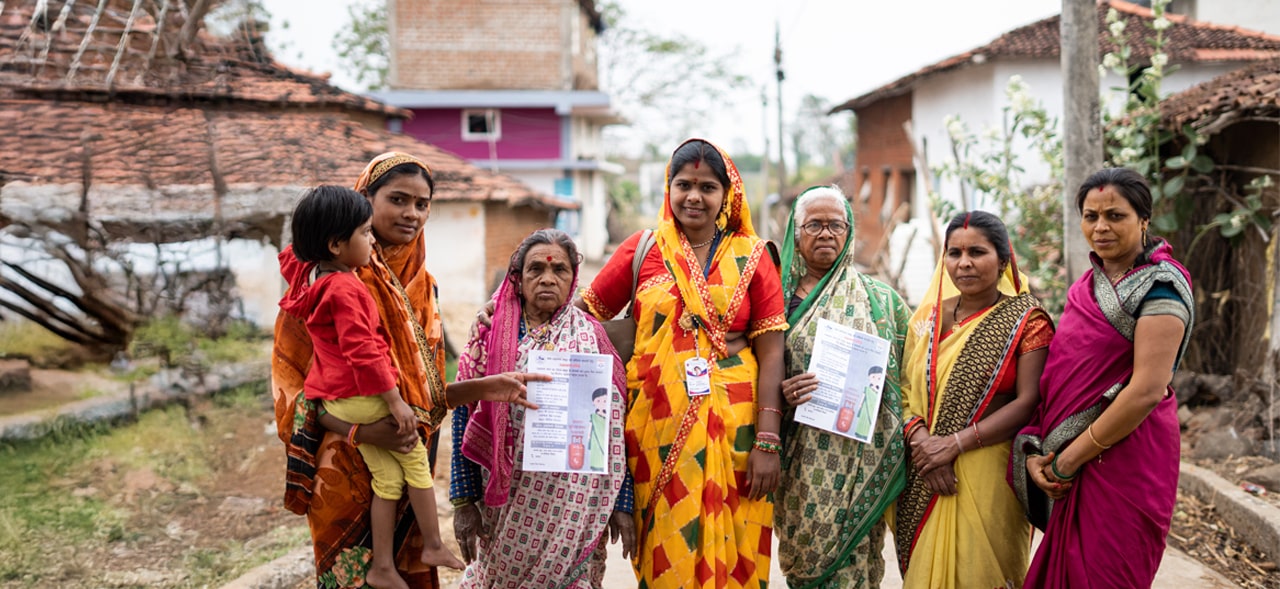
The Swarambh initiative was launched under the Sewapuri Gram Panchayat Saturation Abhiyan, a model block development program spearheaded by the Prime Minister’s office and NITI Aayog. Implemented in the Sewapuri block of Varanasi district, the initiative sought to address the growing demand for digital and entrepreneurial skills among rural youth. It equipped college students, especially young women, with the capabilities needed to thrive in India’s evolving digital and gig economy.
MSC, in partnership with Medha (an NGO), supported the end-to-end design and implementation of the Swarambh programme. The intervention followed a three-phased delivery model, comprising orientation and training, one-on-one mentorship, and hands-on live projects. The curriculum emphasized real-world skill-building in areas such as digital freelancing, photography, handicrafts, and baking. With the support of local administration and multiple central and state departments, MSC successfully executed the programme across three cohorts and reached more than 75 students.
The initiative fostered entrepreneurial mindsets and built a cadre of self-reliant, digitally skilled youth ready to participate in the informal economy. It created income-generating opportunities through gig and freelance work and strengthened networks of collaboration among participants to sustain long-term engagement. By promoting localized economic development and sustainable livelihoods, the programme contributed to national development priorities. Swarambh also demonstrated a scalable and replicable model for rural youth empowerment across India.
NITI Aayog commissioned the project.

Reliance Foundation, in partnership with MSC, launched a one-year initiative to strengthen the entrepreneurial capacity of 100–120 rural women kirana entrepreneurs (RWKEs) across three districts of Madhya Pradesh. These women, often operating in low-resource and tribal regions, face persistent barriers in accessing markets, finance, and digital tools. The project was designed to address these challenges by enhancing their business skills, resilience, and access to essential services.
MSC led the end-to-end execution of the initiative through a structured and participatory model. The engagement began with the mobilization and selection of RWKEs, with a focus on aspirational and tribal areas. We then conducted tailored needs assessments to understand the specific constraints faced by the entrepreneurs and designed a contextualized training curriculum to emphasize entrepreneurship, financial literacy, digital enablement, and leadership. The program further delivered capacity-building workshops reinforced through continuous mentoring. A key component of the initiative is the “pitch your business plan” event, in which selected RWKEs present their business proposals to a jury. Winners receive seed funding from Reliance Foundation to grow their businesses. MSC also provided post-training handholding, including exposure visits to successful enterprises and support for market linkages through local ecosystem actors.
This project is expected to significantly improve the RWKEs’ access to finance, markets, and technology, enabling them to transition into more sustainable and growth-oriented businesses. The intervention will result in a replicable training framework suitable for similar rural contexts and generate actionable insights to inform future programs targeting women-led microenterprises in low-income and tribal regions.
Reliance Foundation, in collaboration with the Women Entrepreneurship Platform (WEP), commissioned the project.

Youth across Africa face persistent challenges in entering the agricultural sector due to structural barriers such as limited access to finance, land, training, and inputs, as well as outdated perceptions of agriculture as an unattractive livelihood option. In response, AGRA engaged MSC to develop the Youth in Agriculture Ecosystem Development Framework (Y-EDF) across Malawi, Rwanda, and Ghana. The goal was to transform agriculture into a viable and appealing employment pathway for young people through ecosystem-wide support and inclusive market access.
MSC provided end-to-end support for the design and implementation of the Y-EDF. Drawing on its deep expertise in youth development and agriculture, MSC mapped key ecosystem actors to assess engagement gaps and identified high-potential value chains for job creation. The team facilitated extensive consultations with over 200 youth and more than 60 stakeholders through FGDs and KIIs to ensure the framework was youth-informed and contextually grounded. MSC also developed three guiding reports—Country Opportunity, Youth Opportunity, and Ecosystem Mapping—and designed a five-year investment plan (2025–2029) to align resources, track progress, and mobilize funding for youth-led agricultural initiatives. To drive implementation, MSC facilitated country-level validation workshops, prepared policy briefs, and supported AGRA in stakeholder alignment and advocacy. The Y-EDF provides a roadmap for inclusive, youth-centric ecosystem building, offering AGRA and its partners an adaptable model for replicating this approach across other African nations.
The framework resulted in country-specific opportunity roadmaps and an actionable investment strategy to support youth employment in agriculture. It also contributed to stronger stakeholder coordination and cross-sector collaboration. AGRA is now integrating the framework into its wider programming, with the Y-EDF serving as a strategic tool to position agriculture as a viable livelihood for young people.
AGRA (Alliance for a Green Revolution in Africa) commissioned the project.

In response to the persistent barriers faced by young entrepreneurs in Senegal, including limited access to technical skills, infrastructure, mentorship, and financing. MSC partnered with Expresso Innovation Hub as part of the Youth Livelihoods in Digital Financial Services (YLDFS) project to strengthen its incubation approach for youth-led startups. The initiative was designed to build a supportive and scalable ecosystem to nurture entrepreneurship among Senegal’s youth population and drive small business success in a challenging environment.
MSC provided strategic and operational support to the incubator, with a focus on strengthening cohort selection methodologies, embedding financial education, and delivering customized capacity-building support for both incubator staff and startup teams. The engagement involved strategy design, cross-program learning, and development of a structured mentorship framework. We also supported the integration of coaching, training bootcamps, and one-on-one mentorship to guide early-stage entrepreneurs from ideation to execution.
Over the eight-week incubation cycle, startups participated in 12 intensive training sessions and 3 networking meetups, to gain practical exposure to entrepreneurship. One-on-one coaching was provided to refine business models and support early-stage growth. As a result, 129 youth engaged in structured meetups, 23 jobs were created in the month following the incubation, and select participants secured contracting opportunities or advanced product development efforts. The program also led to improved understanding of formalization, financial management, and iterative prototyping techniques among youth entrepreneurs. For Expresso, the project strengthened its internal incubation methodology, promoted ecosystem collaboration, and laid the foundation for competency-based, scalable incubation programs. The initiative offered a robust model to prepare startups for market entry and financing and is expected to serve as a replicable framework for other youth-focused incubators in the region.
The Mastercard Foundation commissioned the project.

Under the Youth Livelihoods in Digital Financial Services (YLDFS) initiative, the Mastercard Foundation (MCF) commissioned MSC to explore innovative models for improving financial resilience among youth in the gig economy. MSC partnered with Lynk, a digital platform that connects informal skilled workers to customers, to cocreate sustainable microinsurance product concepts tailored to the needs of young gig workers.
MSC conducted detailed market research to understand the specific needs and risks faced by gig workers on the Lynk platform. The engagement involved co-designing microinsurance concepts—including traditional push models, pull models, and pay-as-you-go solutions—aligned with workers’ irregular incomes and varying risk profiles. We also facilitated partnerships with local insurers to assess operational feasibility and helped structure a pilot-ready product design. Through this collaboration, we supported Lynk in identifying its short-term insurance requirements and co-developing an umbrella Personal Accident (PA) insurance coverage for its active professionals. An agreement was structured to allow for mass coverage, capable of protecting 400+ workers engaged by Lynk in a single day. MSC also introduced experiential learning approaches using digital tools to promote continuous financial literacy among youth workers.
The insurance product developed under this initiative is currently undergoing pilot implementation in partnership with Britam Kenya, with early results expected to inform future insurance models for the informal sector. This work lays the groundwork for scalable, technology- driven insurance solutions that can enhance income security and improve the livelihoods of gig workers across Africa.
Mastercard Foundation commissioned the project.

KSP TLM, a cooperative operating in Kupang City, East Nusa Tenggara, Indonesia, wanted to modernize its operations by replacing its legacy system with a robust Core Banking Solution (CBS). This transition was part of the cooperative’s broader digital transformation strategy to improve operational efficiency, meet regulatory requirements, and enhance client service delivery. Opportunity International Australia (OIA) commissioned MSC to lead the CBS implementation process.
MSC was engaged as the lead consulting partner to provide comprehensive, end-to-end support for the CBS implementation. The assignment began with a detailed requirements analysis to identify feature enhancements, particularly in savings modules and functional gaps.
MSC coordinated closely with the CBS vendor to align system modifications with TLM’s operational needs and managed the full data migration process, including extraction from legacy systems, data cleansing, and structured integration into the new CBS. The team also led the development of a Training of Trainers (TOT) strategy to build internal capacity for long-term sustainability. A phased rollout approach, combined with a parallel run plan, was adopted to ensure minimal disruption during go-live. Post-go-live support was embedded into the project to address system stabilization and user adoption issues.
The ongoing project is set to deliver a fully customized CBS tailored to TLM’s needs. It is also expected to improve internal system proficiency, ensure operational continuity, and significantly enhance the client experience through more efficient and reliable service delivery.
Opportunity International Australia (OIA) commissioned the project.





